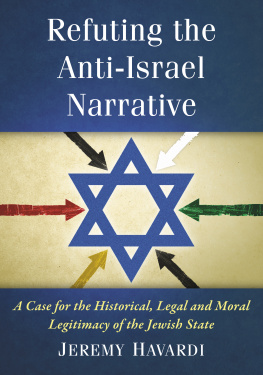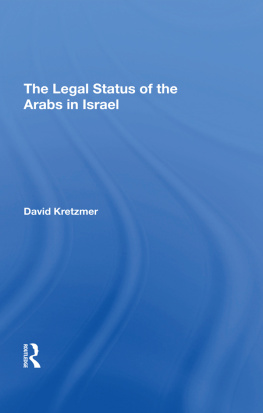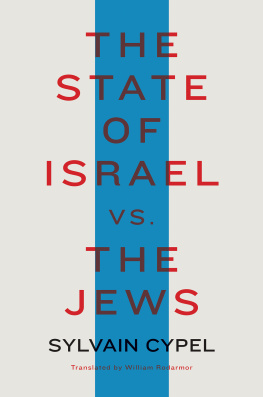
Also by JEREMY HAVARDI
Projecting Britain at War: The National Character in British World War II Films (McFarland, 2014)
Refuting the Anti-Israel Narrative
A Case for the Historical, Legal and Moral Legitimacy of the Jewish State
Jeremy Havardi

McFarland & Company, Inc., Publishers
Jefferson, North Carolina
LIBRARY OF CONGRESS CATALOGUING DATA ARE AVAILABLE
BRITISH LIBRARY CATALOGUING DATA ARE AVAILABLE
e-ISBN: 978-1-4766-2297-2
2016 Jeremy Havardi. All rights reserved
No part of this book may be reproduced or transmitted in any form or by any means, electronic or mechanical, including photocopying or recording, or by any information storage and retrieval system, without permission in writing from the publisher.
McFarland & Company, Inc., Publishers
Box 611, Jefferson, North Carolina 28640
www.mcfarlandpub.com
To all those in the Middle East who struggle peacefully
for democracy, freedom, human rights
and, above all, the truth
Preface
We live in an era shaped by a postmodern attitude towards truth and reality. For many, the age-old requirement to check viewpoints against evidence and logic is an anachronism. Instead, subjectivity and personal feelings have taken over as the arbiters of truth; literally anything goes in judging the validity of opinions. After all, who is to judge what is true and false when truth is merely an instrument of power (Michel Foucault), when Western intellectual progress is merely imperialist oppression, when all forms of authority are suspect and when individual views matter more than facts and logic?
At the same time we live in an era of conspiracy theory with an instant readiness to seize upon criticisms of the establishment. The Internet has become a prime source for disseminating contrarian perspectives that are designed to shake up the received wisdom about our world. Crackpots and fantasists lend weight to unorthodox opinions, which are then instantly seized upon by an army of devotees. We are awash with what Damien Thomson has called counterknowledge, which he defines as misinformation packaged to look like fact. So ubiquitous is counterknowledge that Thomson warns that the twenty first century is facing a pandemic of credulous thinking.
The combination of these perspectives, with their cavalier attitude towards truth, has led to an avalanche of ill-founded ideas that are passed off as the received wisdom about the world. The 9/11 truth movement, Holocaust denial, Diana conspiracy theories, the Da Vinci code, and the belief in a global Illuminati are just a few of the more modern examples. All are characterized by a belief that the truth has been hidden from us by a set of sinister forces beyond our control, but all involve an equally sinister twisting of the evidence. Moreover, the twin ideologies of Third Worldism and political correctness, which hold sway throughout much of academia, have corrupted debates on race, nationhood and identity. Western ideals have come under relentless assault as a result.
These currents of thought have certainly influenced discussions of the Middle East, at both popular and academic levels. It is common for Israel to be pictured as the primary cause of the regions troubles and as an international pariah deserving isolation and disdain. She has been accused of fomenting violence, terrorism and global crises to serve her own interests. As a result, she has become a pantomime villain par excellence, held to blame for many of the worlds ills.
This book is an attempt to question much of this received wisdom. It exposes the falsifications, distortions and ignorance that lie behind the antiIsrael narrative and suggests how the picture they offer fails to add up when stacked against logic and evidence. The truth about Israel and the wider Middle East has been twisted out of all recognition, and this volume sets the record straight. This subject is increasingly relevant despite the focus of scrutiny in the Middle East shifting in recent years. Recent convulsions in the region, including the Arab Spring, the ouster of the Muslim Brotherhood, the rise of the Islamic State and the Iranian nuclear threat, have removed some focus from Israels relations with its neighbors. But the area of Israel and the disputed territories remains one of the most sensitive conflict zones anywhere on earth, and resolving the conflict is of perennial concern to policy makers.
This is certainly not the first book to challenge the prevailing narrative of the Arab-Israeli conflict. I owe a debt to Alan Dershowitz, whose books The Case for Israel and The Case Against IsraelsEnemies have been influential. Robin Shepherds A State Beyond the Pale has extensively analyzed the mainstreaming of an antiIsraeli discourse in European circles. I should also mention Mitchell Bards Myths and Facts, which offers a detailed rebuttal to many of the egregious falsifications about the conflict. But this book goes further than the others insofar as it does four things: it identifies the main themes in the antiIsrael narrative; it exposes their inherent falsity using evidence and logic; it substitutes an alternative, proIsrael narrative; and, finally, it attacks Israels critics by exposing their hypocrisy and double standards.
My own interest in this subject is longstanding. I have been arguing Israels case since the tender age of 16, when the Arab-Israeli issue came under discussion during A-Level English lessons. Perry Keenlyside, my English literature teacher at Haberdashers Askes, liked to debate politics with his students prior to delving into a passage of Chaucer or Shakespeare. Israel was one of those subjects that produced the liveliest discussions, inevitable perhaps in a school where more than a third of the students were Jewish.
At Bristol University I helped organize an Israel stall for a huge event called One World Day, covered by the local media. I have a vivid recollection of warmly greeting the representative of Egypt and of being snubbed by a Palestinian stall-holder. Then there were meetings of the Socialist Workers Party, in which the Middle East was a subject of frequent debate. The mere mention of Israel or America left young hotheads frothing at the mouth in indignation. Their worldview was a simplistic one: these bastions of Western power were pariah states, international outliers that needed to be isolated and brought to an end. In the years since, little has changed.
After the shocking events of September 11, 2001, I made a conscious decision to challenge the myths, lies and falsifications in the Western press. Writing letters to newspapers became an almost daily obsession, particularly during the troubled times of the second intifada. I became a journalist in my early 30s, and letters soon gave way to feature-length articles, opinion pieces and book reviews. I interviewed activists on both sides, as well as politicians, ambassadors and academics. This book builds upon the arguments put forward over many years.
This volume should appeal to a variety of audiences. First, it should interest university students reading modern history or politics, particularly those pursuing Middle East studies who seek an alternative to the Arabist narrative so prevalent within academia. Second, it contains arguments and rebuttals that can be used by proIsrael advocates to put forward their case. Last, it is aimed at all those who question the received wisdom about Israel and the Middle East and who maintain an interest in this most complex, longstanding and seemingly unsolvable conflict.
Next page










